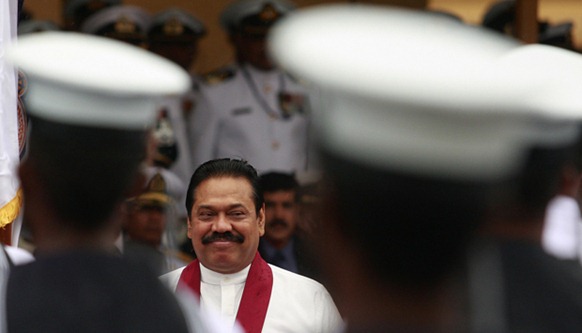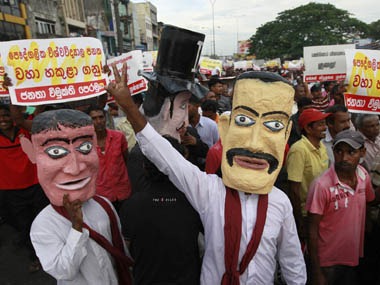 The modern history of Sri Lanka, centered around the politics of its Tamil minority population and its umbilically bound relationship with India, is one of broken promises, linguistic chauvinism, mutual distrust – and all-round treachery.
The modern history of Sri Lanka, centered around the politics of its Tamil minority population and its umbilically bound relationship with India, is one of broken promises, linguistic chauvinism, mutual distrust – and all-round treachery.
The annihilation in May 2009 of the Liberation Tigers of Tamil Eelam, which waged a bloody 30-year campaign for a separatist Tamil homeland and was in its time arguably the world’s most ruthless killing machine, gave rise to hopes that Sri Lanka might just be able to break free of its tortured history – and move towards lasting political reconciliation.
But recent twists and turns in the political discourse in the island-nation point to a regression into the old habits of double-speak, and reflect an unwillingness to “seize the moment” to let ancient ethnic quarrels die down.
In particular, President Mahinda Rajapaksa appears in recent days to be walking away from promises he had made to India and to Sri Lanka’s own Tamil minority population that he would seek out a political solution based on devolution of powers to autonomous provincial councils under the 13th amendment of the Constitution.
Even as recently as in January, India’s External Affairs Minister SM Krishna, on a visit to Sri Lanka, had urged the government to move towards such a power devolution arrangement, and had been reassured by Rajapaksa that “he stands by his commitment to pursuing the 13th amendment.”
But in the past week, in his public comments, Rajapaksa has effectively rejected the 13th amendment as the basis for a political settlement. On the first occasion, Rajapaksa, addressing a group of journalists, denied he had ever told India that he would abide by the 13th amendment.

Rajapaksa’s latest political manoeuvre represents the latest in a long line of broken promises – to India and to the Sri Lankan Tamil minority population. Reuters
Asked if he was suggesting that the Indian side had lied when it conveyed Rajapaksa’s pledge, the president did not directly address the question, but suggested that Sri Lankan Tamil political parties should appear before the Parliamentary Select Committee (PSC) that was seized of the matter.
Then, on Saturday, Rajapaksa used the occasion of a Sri Lankan Independence Day address to suggest that the Tamil ethnic minority problem could not be solved by “relying on imported solutions and utilising foreign influences,” but should instead find home-grown solutions drawn up by the PSC.
The allusion to “imported solutions” and “foreign influences” is a snarky reference to the 13th amendment, which came about under the provisions of the Indo-Sri Lanka Accord of July 1987 signed by then President JR Jayawardene and Indian Prime Minister Rajiv Gandhi.
Sinhala resentment against that 1987 accord, which was seen as an interference in Sri Lankan affairs, manifested itself in dramatic fashion the same day that it was signed, when Rajiv Gandhi was attacked by a Sri Lankan Navy soldier during a guard of honour at the Colombo airport. (Watch the video here.)
But the same Rajapaksa government had, in the days after it had declared victory in May 2009 in the war against the LTTE, announced that it would seek out a political solution based on devolution of powers to autonomous provincial councils under the 13th amendment. In fact, Rajapaksa spoke of a “13th amendment plus” solution, suggesting that he would go beyond that provision.
Such a federal power devolution arrangement was seen as a concession to the Tamil aspiration for some form of self-rule without going so far as to concede territorial sovereignty of the sorts that the LTTE had effectively enforced in the northern and parts of the eastern provinces.
But with the power of hindsight, it appears that those pledges of a commitment to the 13th amendment may have been a ruse by the Sri Lankan government to deflect international scrutiny over allegations of human rights abuses and criticism over the loss of civilian lives, particularly in the last days of the war, when LTTE supreme leader Velupillai Prabhakaran was cornered and killed.
Such a pledge also gave the Indian government an alibi to tamp down on Tamil chauvinistic sentiment in Tamil Nadu, where political forces had contributed morally and materially to keeping alive the Tamil Eelam cause.
As a concession to those Tamil chauvinist forces, the Indian government had in the 1980s even provided arms and terrorist training to the LTTE – a shameful patronage of terror for which it paid a heavy price with the May 1991 assassination of Rajiv Gandhi at the hands of the LTTE. Subsequently, the Indian government overcompensated by shielding Sri Lanka from international criticism – solely on the strength of the promise of a political settlement to devolve power.
Rajapaksa’s latest political manoeuvre thus represents the latest in a long line of broken promises – to India and to the Sri Lankan Tamil minority population. That distrust can be traced as far back as the 1957 Bandaranaike-Chelvanayagam pact, which originally conceived of regional councils to give a level of autonomy to Sri Lanka Tamils. The rise of Sinhala chauvinism meant that those promises were never kept, which gradually accentuated the ethnic and linguistic divide – and eventually spawned the terrorist Tamil separatist movement.
Nearly three years after the LTTE’s wipeout, and more than 55 years after that first pledge of some form of self-rule and autonomy for Sri Lankan Tamils, those promises are no nearer to being addressed. If anything, under the 18th amendment to the constitution, power has flowed in the other direction – towards greater centralisation and away from autonomy – with commentaries in the media raising the bogey of a revival of the Tamil Eelam demand if any kind of autonomy is granted to the Tamil people.
(For updates you can share with your friends, follow TNN on Facebook and Twitter )
